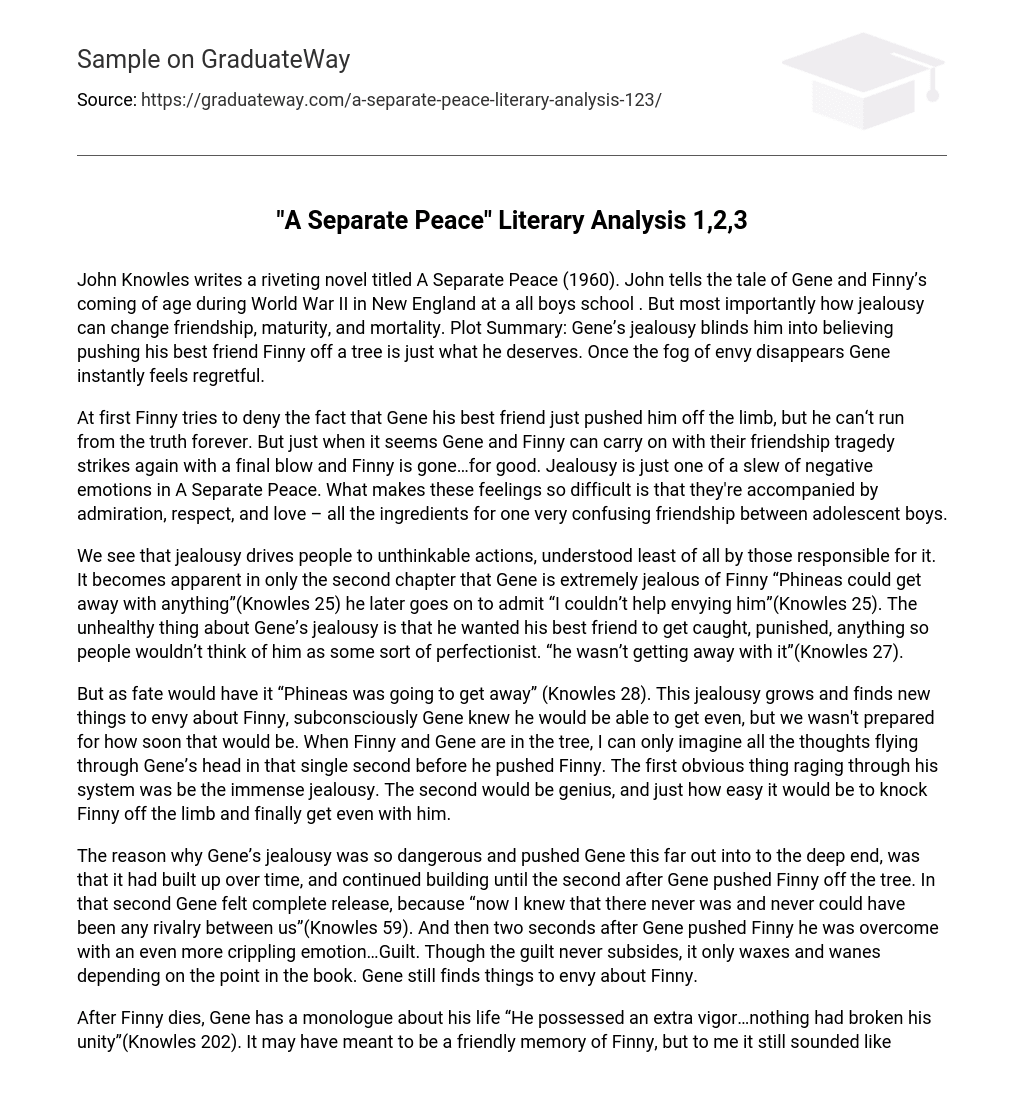John Knowles wrote a captivating novel called A Separate Peace (1960) which depicts the coming of age of Gene and Finny during World War II at an all boys school in New England. The novel explores the theme of jealousy and its impact on friendship, maturity, and mortality. The plot revolves around Gene’s jealousy, which leads him to push his best friend Finny off a tree, believing it to be a justified act. However, once the haze of envy dissipates, Gene immediately regrets his actions.
Initially, Finny attempts to reject the reality that Gene, his closest companion, has just pushed him off the limb. However, he cannot evade the truth indefinitely. Unfortunately, just as it appears that Gene and Finny can continue their friendship, tragedy strikes once more with a decisive blow, resulting in Finny’s permanent departure. Jealousy is just one of numerous negative emotions portrayed in A Separate Peace. The complexity of these emotions arises from the simultaneous presence of admiration, respect, and love – all key elements contributing to a bewildering friendship among adolescent boys.
The text reveals how envy can drive individuals to unexpected and irrational behavior, a concept that may escape those responsible for generating it. The extent of Gene’s jealousy towards Finny becomes evident in the second chapter as he acknowledges Finny’s ability to escape consequences: “Phineas could get away with anything” (Knowles 25). Furthermore, Gene admits to his own envy: “I couldn’t help envying him” (Knowles 25). What makes Gene’s jealousy troubling is that he actually desires his best friend to face consequences and be exposed, simply to challenge the perception of his own perfectionism: “he wasn’t getting away with it” (Knowles 27).
As destiny would have it, “Phineas was going to get away” (Knowles 28). This envy grows and discovers new aspects to covet about Finny. Subconsciously, Gene knew he would have the opportunity to seek revenge, but he was not prepared for how soon it would come. When Finny and Gene are on the tree, I can only imagine the multitude of thoughts rushing through Gene’s mind in that brief moment before he pushed Finny. The first evident emotion coursing through his body was intense jealousy. The second was a realization of how ingenious and effortless it would be to push Finny off the branch and finally settle the score.
Gene’s jealousy towards Finny had grown over time and reached its peak when he pushed Finny off the tree. Immediately after this action, Gene felt a sense of relief, realizing that there was never any rivalry between them (Knowles 59). However, just two seconds later, he was overwhelmed by guilt, an emotion that never fully goes away but rather fluctuates throughout the book. Despite these conflicting emotions, Gene still finds himself envious of Finny at different points.
After Finny’s death, Gene reflects on his life saying, “He possessed an extra vigor…nothing had broken his unity” (Knowles 202). Although it was intended as a fond memory of Finny, it still seemed to me that Gene was envious. Gene envied the way Finny carried himself throughout school, even when he broke his leg. Finny seemed to effortlessly evade both trouble and death. He died peacefully, having resolved his conflicts with Gene and overcoming his frustration of not being able to join the army. Stay tuned for parts 4-7 on a forthcoming page!





